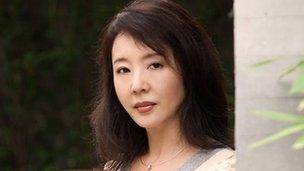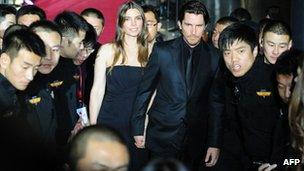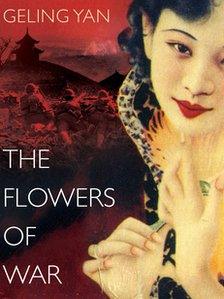The story behind Chinese war epic The Flowers of War
- Published

Author Geling Yan says she did not want her novel or the film to demonise the Japanese
The Chinese epic The Flowers of War failed to gain a highly-coveted Oscar nomination in the Best Foreign Language Film category. But as Bethan Jinkinson reports, the historical drama has resonated with Chinese audiences.
The film, directed by Zhang Yimou and starring English actor Christian Bale, opened in China on 16 December.
Since then it has been shown on thousands of screens across the country, taking $93m (£60m) gross in its first five weeks, according to entertainment research group EntGroup Consulting.
It was also the highest-grossing Chinese film of 2011.
Based on a novel by Chinese-American author Geling Yan, it is set in the Chinese city of Nanjing at the time of the Japanese invasion.
In one of the most notorious episodes of Japan's occupation of China, tens of thousands of Chinese were killed and raped there by the invading army between December 1937 and March 1938.
In the film a Westerner, played by Christian Bale, finds refuge with a group of women hiding in a church in Nanjing whilst Japanese soldiers sack the city. Posing as a priest, he attempts to lead the women to safety.
'Extraordinary action'
Author Geling Yan says she was inspired to write her novel after reading an account by Minnie Vautrin, an American missionary who ran a college in Nanjing.
The Ginling Girls college became a haven for students and other women in the city, including some prostitutes.
When Japanese soldiers arrived demanding "comfort women" - a euphemism for sex slaves - Ms Vautrin faced the dilemma of letting the so-called "good" women go or giving them the prostitutes.
"This moment is very crucial," Geling Yan told the BBC. "If those prostitutes don't step forward, the Japanese will take the civilian women."
The prostitutes did step forward and were taken away by the soldiers and never heard from again.
"Ms Vautrin spent her whole life thinking [about] and contemplating this event, and she regretted that she submitted these women to the Japanese," says Ms Yan.
"These few lines in her biography touched me... even though the prostitutes were seen as very base, not so pure... they stepped forward to protect these young women. I think it was an extraordinary action."
'Tragic and beautiful'

The Flowers of War was billed as the first Chinese production with a Western star
Whilst Geling Yan was inspired by the Minnie Vautrin account, she chose to tell the story of the Nanjing massacre through the eyes of a 13-year-old girl.
One of the novel's main themes is the clash between innocence and experience, she says.
"What I wanted to stress in this story is the young girls, the virgins are the most final conquest of the conquerors, especially for the Japanese - you cannot call it a complete conquest unless you can conquer the enemy country's women.
"So the young girls coming of age are the most vulnerable and most desirable of the conquest... by protecting them I wanted to make the story more tragic and more beautiful."
Critics say the film is nationalistic and anti-Japanese, but Geling Yan says that was not her aim.
"In the movie we created - with the director and the screenplay writer - an officer who loved music and who misses his country, his home."
"We didn't want to demonise the soldiers, but we just wanted to emphasise [that] in wartime all human nature can transform in the blink of an eye.
"So-called 'base women' can become... angelic, and the Japanese soldiers, normal young men, can become vultures. So it's just war that triggers all the goodness and sometimes the darkness of human nature.
'Positive story'
Lijia Zhang, a commentator based in Nanjing, says that when she went to see the film, the audience reaction was "very powerful".

The book was originally called 13 Flowers of Nanjing
"I wouldn't call it a propaganda film but I think it passed the censorship very easily," she said.
"It's a positive story... and it puts the Chinese in a good light. It's part of history and for understandable reasons, China wants the world to understand it."
In recent years there have been several films and television dramas about the Nanjing massacre - but Ms Yan says she found it much easier to find historical documents, pictures and film footage from the time outside China.
She did manage to get hold of the diary of her father's uncle, an army doctor in Nanjing, which provided her with more detail.
Despite her extensive research, Ms Yan says she does not want her fictional account to be seen as a historical record.
"The story is just fiction, a literary novel, and I hope it remains that way."
Lijia Zhang - who is also a friend of Geling Yan - says she thinks the film had much potential that was unfortunately not quite realised.
"The original novel is I think more interesting, it focuses very much on the women's story.
"But in the film I think too much emphasis has been placed on the Hollywood star."
Lawrence Pollard interviewed Geling Yan for The Strand on the BBC World Service.
- Published12 December 2011
- Published11 December 2011